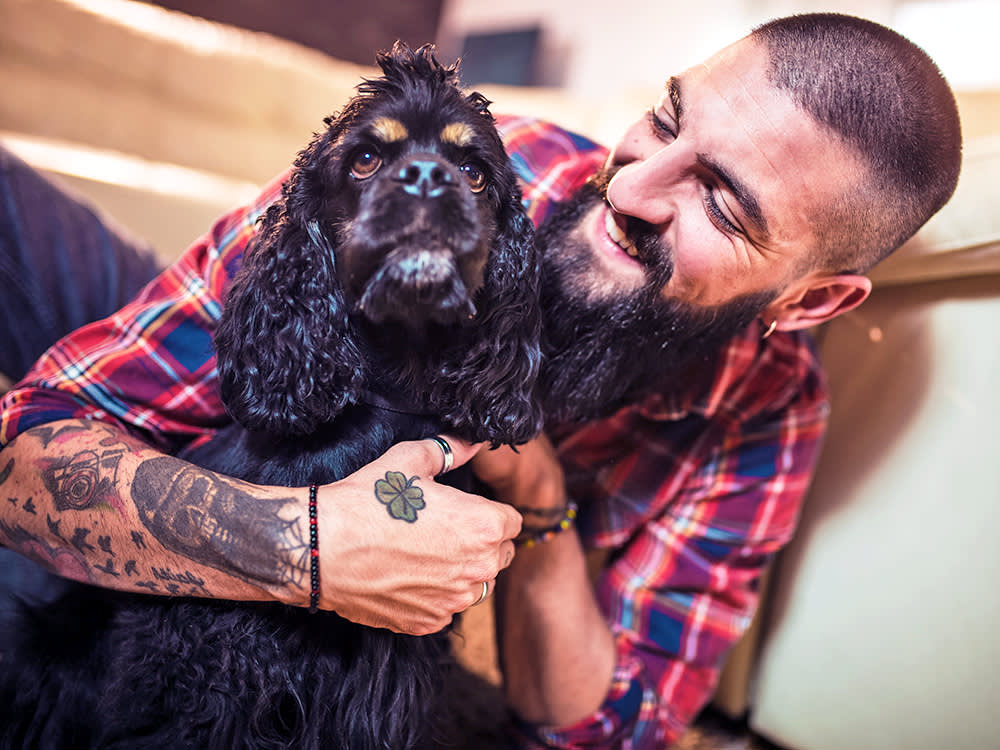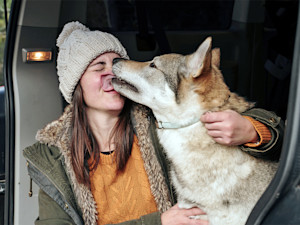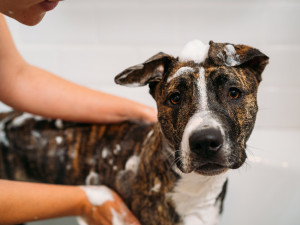A Study Says Men’s Beards Are Dirtier Than Your Dog—Is That True?
You may never look at your boyfriend (or your pup) the same again.

Share Article
There are some things that you just hear so often — at parties, on the street, in the office, etc. — that you automatically believe them: Gum sits for years in your stomach after you swallow it; you can catch a cold from cold weather; men’s beards are dirtier than dogs.
As for that last one, I wouldn’t blame you for believing it outright, especially if you’ve been told there’s scientific evidence that proves it. One could argue that men don’t have the greatest reputation when it comes to hygiene, based simply on the fact that so many people readily believe they are dirtier than literal dogs. However, it’s not necessarily true.
Is there actually a study that found more bacteria in men’s beards than on dogs’ fur?
Technically, yes. In 2018, the scientific journal European Radiologyopens in new tab published the findings of a study comparing the hygiene of dogs and humans. Researchers from Switzerland measured the bacterial load of of 18 men, ages 18 to 76, and 30 dogs of varying breeds, including Dachshunds, Border Collies, and German Shepherds. For the men, researchers collected samples from their beards, both on their face and neck, along with their saliva. For the dogs, they collected samples from their saliva and the fur between their shoulder blades, which the study authors describe as a “particularly unhygienic” area.
The results? All 18 men had what the researchers categorized as high microbial counts, while the same was true for only 23 of the 30 dogs. (The other seven dogs had moderate microbial counts.) Additionally, researchers found human-pathogenic microorganisms — which are bacteria known to be harmful to humans — more frequently in human beards (seven of 18) than in dogs’ fur (four out of 30).

These microbes include Enterococcus faecalis, a common gut bacteria that can cause issues like urinary tract infections, and Staphylococcus aureus, which is a common bacteria found on the skin of half of all humans but has the potential to be harmful if it gets into the bloodstream.
…Gross. So, why can’t we definitively say men’s beards are dirtier than dogs?
For starters, the impetus for the study had nothing to do with specifically comparing beard and dog hygiene. The objective for the study, as stated by the authors, was to determine whether it would be safe for dogs and humans to use the same MRI machines.
What do MRI machines have to do with beards and dogs?
Dogs are living longer, which is great! But also means there is an increased need for imaging diagnostics as they get older. It’s not common for a veterinary clinic to have an MRI machine, given how seldom they would use it and how expensive it is. In addition to the beard and fur swabs, this study compared the extent of bacterial contamination in a scanner used exclusively by humans to one used by both dogs and humans.
It remains unclear why the study authors chose bearded men as their comparison group. (In the past, there has been research comparing men’s beards and toilet seatsopens in new tab, which seems like explanation enough.) The study didn’t compare bacterial loads of other human groups — e.g., bald men, men without beards, people with particularly large sideburns — and the authors themselves admit, “There is no reason to believe that women may harbor less bacteriological load than bearded men.” The sample size was also too small to be representative of the greater population.
So, while study author Andreas Gutzeit does write, “On the basis of these findings, dogs can be considered as ‘clean’ compared with bearded men,” the study ultimately concludes: “The central question should perhaps not be whether we should allow dogs to undergo imaging in our hospitals, but rather we should focus on the knowledge and perception of hygiene and understand what poses real danger and risk to our patients.”
Wait! I also heard dogs’ mouths are cleaner than human mouths. Is that true?
This rumor is simply that: a rumor. Comparing a dog’s mouth to a human’s mouth is “like comparing apples and oranges,” Colin Harvey, a professor at the University of Pennsylvania’s School of Veterinary Medicine and the executive secretary at the American Veterinary Dental College, previously told the American Kennel Clubopens in new tab.
The bacteria in a human mouth isn’t directly comparable to that in a dog’s mouth. In fact, Floyd Dewhirst, a bacterial geneticist who pioneered the study on the human oral microbiomeopens in new tab, told National Geographicopens in new tab, “If you look at humans and dogs, we only saw about 15 percent [of bacteria] that are the same species.”
So, beards aren’t inherently dirty, and dogs aren’t surprisingly clean?
Beards certainly aren’t self-cleaning, but there isn’t definitive proof that a bearded face is dirtier than a clean one. One 2014 study actually found that certain bacterial species were more common on hospital workers without facial hairopens in new tab than those with facial hair. Additionally, dogs can put us at risk for certain bacterial infectionsopens in new tab (e.g. Salmonella), and there are some diseases humans can transmit to dogs, like certain strains of influenza.
Good to know. I think I’m gonna go wash my hands now.
Same.

Mia Mercado
Mia Mercado is a writer whose work has appeared in The New Yorker, New York, The New York Times, Cosmopolitan, Bustle, and more. She’s also the author of two essay collections, Weird But Normal (2020) and She’s Nice Though (2022), both published by HarperOne.
Related articles
![Woman cuddling her dog on the floor.]()
5 Ways Your Dog Could Be Putting You at Risk for a Bacterial Infection
Should we let dogs lick our face? Is it safe to wash the family dog in the bathtub? We asked the experts.
Can Humans Get Dogs Sick?
Think of the amount of tissues you’d need...
![A happy woman is lying on a bed, her dog smelling her face.]()
9 Diseases You Can (and Definitely Can’t) Catch From Your Dog
Here’s what you can scratch off your “Worry About This” list.
![Large dog licking woman's face in the back of her car.]()
Letting Your Dog Lick Your Face Could Be Dangerous, New Study Finds
Dogs can spread antibiotic-resistant salmonella to humans, scientists warn.
![A dog getting a bath]()
How Often Should You Wash Your Dog?
“If your dog is stinky or looks dirty, wash ’em!” Plus more pro tips from LA dog groomer Jess Rona.






